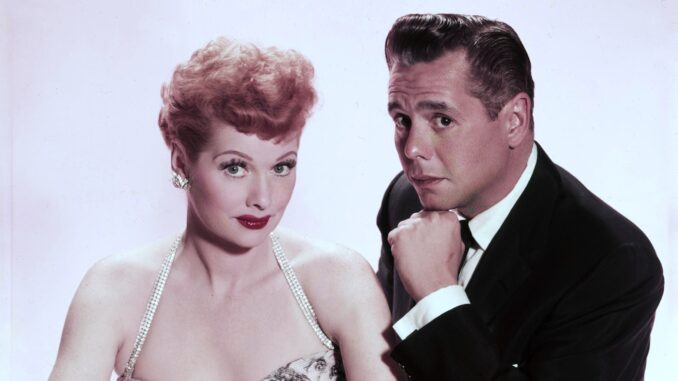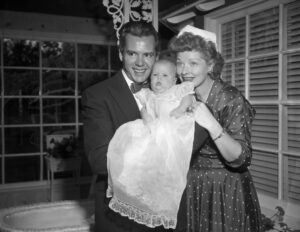
Introduction: A Groundbreaking Moment in Television History
Imagine a time when TV networks considered the word “pregnant” too scandalous to say on air. It seems absurd now, doesn’t it? But in the 1950s, this was reality. Enter Desi Arnaz and Lucille Ball, the trailblazing couple behind I Love Lucy. When Lucy became pregnant in real life, Desi fought tooth and nail to integrate her pregnancy into the show’s storyline. The result? A cultural and television milestone that broke barriers and set new standards for authenticity on screen.
Why Was Pregnancy Taboo on TV in the 1950s?
The 1950s were a conservative era, and television networks operated under strict censorship guidelines. Words like “pregnant” were deemed inappropriate for family audiences. Instead, euphemisms like “expecting” were used to avoid offending viewers. This censorship reflected the societal norms of the time, where discussing private matters like pregnancy was considered improper.
Lucille Ball’s Real-Life Pregnancy: A Turning Point
In 1952, Lucille Ball became pregnant with her second child. This posed a dilemma for the creators of I Love Lucy. Should they hide her pregnancy with loose clothing and clever camera angles, as was the norm? Or should they embrace it and write it into the storyline? For Desi Arnaz, the answer was clear: authenticity mattered.
Desi Arnaz’s Vision for Authenticity
Desi Arnaz was not just Lucy’s husband; he was also a savvy producer and visionary. He believed that audiences would connect with the show even more if it reflected real life. He argued that incorporating Lucy’s pregnancy into the storyline would make the show relatable and groundbreaking. However, convincing the network executives was no small feat.
The Network’s Reluctance: Battling Censorship
CBS executives and sponsors were initially horrified by the idea. They worried that viewers would find the subject inappropriate. The network even questioned whether audiences would accept a visibly pregnant woman on screen. Desi Arnaz, however, was determined to push back against these outdated norms.
The Role of Religion in Winning the Argument
One of Desi’s cleverest moves was appealing to the network’s conservative sensibilities. He argued that pregnancy was a natural and blessed event, even quoting religious principles to make his case. This approach resonated with the executives, who eventually agreed to the idea under strict conditions.
The Compromise: Strict Guidelines for the Script
While CBS approved the storyline, they imposed strict rules. The word “pregnant” was still banned, so the writers used “expecting” instead. Additionally, every script had to be reviewed by a priest, a rabbi, and a minister to ensure it met moral standards. Despite these restrictions, Desi and the writers crafted a storyline that was both tasteful and groundbreaking.
The Famous Episode: “Lucy Is Enceinte”
The episode where Lucy announces her pregnancy, titled “Lucy Is Enceinte” (French for “pregnant”), aired on December 8, 1952. The emotional scene where Lucy tells Ricky she’s expecting brought audiences to tears and remains one of the most iconic moments in television history.
Breaking Records: The Birth Episode
The culmination of this storyline was the episode “Lucy Goes to the Hospital,” where Lucy gives birth to Little Ricky. This episode aired on January 19, 1953, and coincided with Lucille Ball’s real-life delivery of her son, Desi Arnaz Jr. It drew an audience of 44 million viewers—more than the presidential inauguration of Dwight D. Eisenhower the next day!

Cultural Impact: Changing the Narrative
The success of Lucy’s pregnancy storyline shattered the taboo surrounding pregnancy on TV. It opened the door for more realistic depictions of family life in sitcoms. Shows like The Dick Van Dyke Show and Friends owe a debt to the trail Desi and Lucy blazed.
Desi Arnaz: A True Innovator
Desi Arnaz’s fight to include Lucy’s pregnancy wasn’t just a victory for the show; it was a victory for representation and authenticity in media. His boldness proved that audiences were ready for content that reflected real life, even if it challenged societal norms.
How Lucille Ball Felt About the Decision
Lucille Ball fully supported Desi’s efforts to include her pregnancy in the show. She later described the experience as one of the most rewarding aspects of her career. By embracing her real-life role as a mother, she connected with audiences on a deeply personal level.
The Legacy of Lucy’s Pregnancy Storyline
Even decades later, Lucy’s pregnancy storyline remains a defining moment in television history. It set a precedent for tackling real-life issues with humor and heart, proving that comedy could also be groundbreaking.
Why This Story Still Matters Today
In today’s world, where authenticity is highly valued, the story of Desi Arnaz and Lucille Ball’s battle feels more relevant than ever. It’s a reminder that pushing boundaries can lead to lasting change, both in media and society.
Conclusion: A Bold Step Forward
Desi Arnaz’s determination to include Lucille Ball’s pregnancy in I Love Lucy wasn’t just a creative decision—it was a cultural revolution. By challenging outdated norms, he and Lucy paved the way for future storytellers to bring authenticity to the screen. Their legacy continues to inspire generations of creators and audiences alike.
FAQs
1. Why was pregnancy considered taboo on TV in the 1950s?
Television censorship guidelines of the 1950s deemed pregnancy too private and inappropriate for family audiences, reflecting the conservative norms of the era.
2. What was the significance of the episode “Lucy Goes to the Hospital”?
This episode drew 44 million viewers, making it one of the most-watched episodes in TV history and a cultural milestone.
3. How did Desi Arnaz convince CBS to include Lucy’s pregnancy?
Desi appealed to the natural and religious aspects of pregnancy, arguing that it was a blessed and relatable event.
4. Why was the word “pregnant” banned on I Love Lucy?
Censorship guidelines considered the term too explicit, so the show used “expecting” instead.
5. What is the legacy of Lucy’s pregnancy storyline?
It broke taboos, set new standards for authenticity in media, and paved the way for more realistic depictions of family life on television.